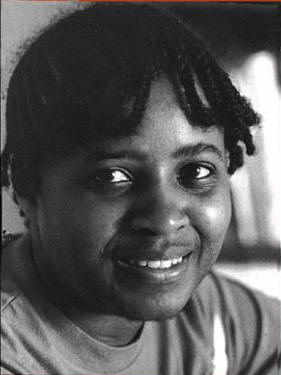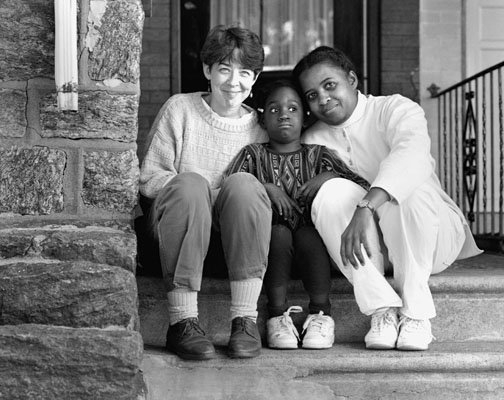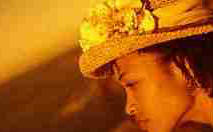




















































































 
|
 Becky
Birtha -- Writer Becky
Birtha -- Writer
It is not uncommon to hear someone express
disappointment by beginning a sentence with the words "in a
perfect world . . ." Becky Birtha's poems exist in that
perfect world, a world of tolerance, clarity, and understanding.
Consistently, Ms. Birtha expresses more hope that such a world
will certainly become real than any bitterness at how it remains
elusive. Her poems about relationships, her garden, the
countless large and small incidents which make up a personal
history bear the stamp of her experiences as an African
American, a Quaker, and a lesbian feminist. But Ms. Birtha's
voice carries beyond any of these neatly definable criteria of
"identity" and speaks to her reader about universal themes of
loss and hope.

|
|
Letha Bruce,
Tasha Birtha, & Becky Birtha of Philadelphia, Penn. Becky
adopted Tasha. Letha was Becky’s partner and, though now
living out of state, is still close and part of the family.
|
Ms. Birtha holds an M.F.A. in creative writing
from Vermont College and a B.S. in children's studies from SUNY
at Buffalo. Her honors include a Pennsylvania Council on
the Arts Individual Fellowship and a National Endowment for the
Arts Creative Writing Fellowship. She has published three books
of poetry, including the 1991 collection "The Forbidden Poems,"
and her work is included in several anthologies. She currently
teaches at Goddard College and at Bryn Mawr College.
Becky defines herself as a black lesbian
feminist Quaker from a middle-class background. She grew up
primarily in Philadelphia, where she produced two collections of
short stories and The Forbidden Poems (1991), a
collection of her poetry. Her work has appeared in many
anthologies. In 1985 she was awarded an Individual
Fellowship in Literature from the Pennsylvania Council for the
Arts, and in 1988 she received a Creative Writing Fellowship in
literature from the National Endowment of the Arts.
Becky Birtha was born in Hampton, Virginia,
and is the namesake of her great-grandmother, who was a slave.
Birtha also claims Irish, Cherokee, and Catawba roots, a
heritage which manifests itself in the multicultural slant of
her fiction and poetry. She spent most of her childhood in
Philadelphia, and attended college at Case Western Reserve
before dropping out to move to Berkeley, California. There
she experienced the most intense times of the Berkeley protests
and People's Park. She soon moved to New York where she
graduated from SUNY Buffalo with a self-designed major in
children's studies.
 Birtha's
first short fiction collection, For Nights Like This One
(1983), is an insightful look at the politics of lesbian and
interracial relationships. In her second collection of short
fiction, Lover's Choice (1987), Birtha creates complex
characters, individuals who arrive at crossroad moments which
require them to make critical life-changing decisions.
Many of her characters are involved in interracial
relationships. Birtha courageously depicts white women
through black women's eyes, writing freely from a black lesbian
perspective. Birtha's
first short fiction collection, For Nights Like This One
(1983), is an insightful look at the politics of lesbian and
interracial relationships. In her second collection of short
fiction, Lover's Choice (1987), Birtha creates complex
characters, individuals who arrive at crossroad moments which
require them to make critical life-changing decisions.
Many of her characters are involved in interracial
relationships. Birtha courageously depicts white women
through black women's eyes, writing freely from a black lesbian
perspective.
Lover's Choice takes the reader on short trips into the
lives of eleven different women. Through her stories, Becky
Birtha creates a sense of continuity by weaving strength,
passion, pain, and ingenuity into each character. Ms. Moses
makes clear that the government doesn't really help the poor: "Ain't
no reason for you to be gaping at me. I pay my taxes, just like
everyone else." Sahara "never wanted a man...Sometimes it
seems she has spent her whole life finding ways to get close to
other people's children." Camped out under the stars, she
thinks back over those children and opens her heart to yet
another one. Maurie questions her taste in women: "White
Anglo-Saxon Protestants. The Bourgeoisie. What the hell was she
doing in love with someone...like that?" And Johnnieruth,
who can ride her bike as fast as the boys and resents her mother
trying to rein her in because she's a girl, watches in a park as
two women greet each other with a kiss on the lips. For the
first time, she sees herself mirrored. Lover's Choice is unusual
in its ability to show the interconnectedness of eleven separate
lives. Becky Birtha makes the reader care for and relate to each
character as an individual, and as part of the whole that we
call woman.
Source:
http://www.pewarts.org/93/Birtha/
|
|

|


Back cover

Excerpt
For Nights Like This One : Stories of Loving Women
by
Becky Birtha
The Forbidden Poems
by
Becky Birtha
|
|

|